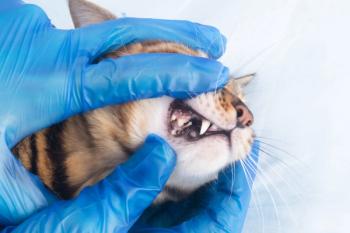
Just Ask the Expert: Bartonellosis and feline gingivostomatitis: Is there a relationship?
Veterinary dentist Dr. Daniel Carmichael asnwers this reader query.
Dr. Carmichael welcomes dentistry questions from veterinarians and veterinary technicians.
We routinely test cats and kittens for bartonellosis. Because the clinical signs of gingivitis and stomatitis are usually seen in 45% of cats with bartonellosis, why not test and treat for this disease before extracting their teeth?
A. The clinical signs of feline gingivostomatitis are well known to all of us. Since the only reliable cure for this disease is extraction of most (the teeth caudal to the canines) if not all the teeth, it is tempting to look for alternative treatments. A recent hypothesis is that feline gingivostomatitis is caused by Bartonella species infections and that treating for bartonellosis will cure the condition.
Dr. Daniel T. Carmichael
PREVALENCE AND ASSOCIATED CLINICAL SIGNS
Feline bartonellosis can be caused by several species of Bartonella, but studies show the most common to be Bartonella henselae. Since the flea (Ctenocephalides felis) is the vector that allows Bartonella species transmission between cats, the prevalence of bartonellosis is greatest in areas where fleas are common. Overall, about 35% of cats will have positive test results for B. henselae, but infection rates in localized areas may become much higher. Most cats with serologic evidence of Bartonella species exposure are clinically normal. Bartonella species infection in cats has been associated (directly or indirectly) with a variety of clinical signs including uveitis, fever, lymphadenopathy, gingivitis, and neurologic disease, but the percentage of cats that truly become sick from Bartonella species infection is not known. It is safe to say that most cats that are seropositive for Bartonella species do not exhibit any of these clinical signs.
WHAT TEST RESULTS AND TREATMENT RESPONSE INDICATE
Because there is so much confusion over the results of testing for bartonellosis in cats (false positive and false negative results), it is currently recommended to not test healthy cats for Bartonella species infection in the United States. Of course, this is a broad recommendation, and it may be appropriate to routinely test in certain geographic locations (such as areas of extreme flea infestation).
Gingivitis and stomatitis are also common in cats. The disease feline gingivostomatitis is not so common, but common enough to frustrate all of us. When we try to decide if two common diseases (such as bartonellosis and oral inflammation) are related by a causal association or just occur together coincidentally, we need to be cautious. Although the etiology of feline gingivostomatitis is multifactorial, a significant factor is antigenic stimulation of the oral immune system caused by plaque bacteria. If the cat is also seropositive for Bartonella species and its mouth looks clinically improved after a few weeks of azithromycin, it is tempting to think that we successfully treated the cat. However, all that probably happened was a temporary suppression of the plaque bacterial load and a temporary reduction in the immune response to those bacteria.
THE BOTTOM LINE
In a recent, well-conducted study, neither B. henselae nor feline immunodeficiency virus, feline leukemia virus, or feline herpesvirus was found to be associated with feline gingivostomatitis.1 Not surprisingly, feline calicivirus was associated with gingivostomatitis, but we have known of this association for years.
The bottom line is that there is no association between feline gingivostomatitis and bartonellosis. Routine testing of healthy cats, or even cats with oral inflammation, is not indicated. If gingivostomatitis is diagnosed, the only known cure is extraction of most or all of the teeth, and my recommendation remains to do so as soon as possible and before administering injection after injection of methylprednisolone acetate.
Daniel T. Carmichael, DVM, DAVDC
Veterinary Medical Center
75 Sunrise Highway
West Islip, NY 11795
REFERENCE
1. Belgard S, Truyen U, Thibault JC, et al. Relevance of feline calicivirus, feline immunodeficiency virus, feline leukemia virus, feline herpesvirus, and Bartonella henselae in cats with chronic gingivostomatitis. Berl Munch Tierarztl Wochenschr 2010;123(9-10):369-376.
Newsletter
From exam room tips to practice management insights, get trusted veterinary news delivered straight to your inbox—subscribe to dvm360.




